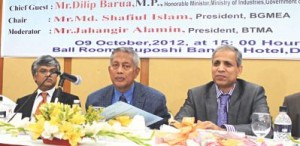


October 10, 2012
Bangladesh seeks more cooperation in RMG trade
Bangladesh has the opportunity to grab a significant portion of apparel trade made among the Developing 8 (D-8) member countries, an analyst said.
D-8 is an important market as it has around 1 billion people with an average per capita income of $2,750, said Mustafizur Rahman, executive director of Centre for Policy Dialogue.
Although the D-8 countries export around $49 billion worth readymade garment (RMG) products annually, they also import over $5 billion worth of apparels from other countries, according to Rahman.
“So there is an enormous opportunity lying for Bangladesh,” said Rahman at a seminar, “D-8 Co-operation in Textile and Garments Industries: Way Forward”, held at Ruposhi Bangla Hotel yesterday.
In his keynote, GKM Towfique Hassan, an adviser to Bangladesh Textile Mills Association (BTMA), said Turkey is the most promising market among the D-8 nations for RMG exports from Bangladesh.
Bangladesh's RMG exports to Turkey in fiscal 2011-12 stood at $355.93 million, a 31.3 percent decline from the previous fiscal year's $518.32 million, according to Hassan.
Turkey's introduction of high duty on apparel imports last year is cited as the reason for the decline, Hassan added.
BTMA President Jahangir Alamin said D-8 countries represent a sixth of the world's population.
“So we have to give focus on intra-regional trade.”
Although intra-trade among the D-8 countries is not satisfactory, it has tremendous potential, said Alamin.
He said since Bangladesh is not a cotton producing country, it can procure raw cotton from the D-8 countries.
“Pakistan, Turkey and Egypt produce raw cotton,” said A Matin Chowdhury, a former president of BTMA.
Bangladesh meets its total annual raw cotton demand of 3.7 million bales solely through imports.
“So we can work as a complement for each other as,” he said.
Chowdhury, who is also the managing director of Malek Spinning Mills, said distance and communication barrier are proving to be the main hindrance for intra-regional trade.
“Bangladeshi businessmen are facing problems communicating with businessmen from Turkey due to language barrier.”
Bangladesh Garment Manufacturers and Exporters Association (BGMEA) President Shafiul Islam Mohiuddin said Bangladesh needs to focus on regional trade to make up for the global recession.
“The trade among the D-8 member countries will offset the shortfall.”
Mohiuddin also called for strengthening the D-8 secretariat for the purpose of expanding trade among the member countries.
Industries Minister Dilip Barua said Bangladesh is the second largest RMG exporter of the world after China.
“The world is now facing a business cold war.”
Barua said effective functioning of the D-8 secretariat can solve trade barriers among the members.
Murad Karka, secretary general of the Turkey-Bangladesh Chamber of Commerce and Industry, said the bottlenecks that are hurting the bilateral trade between Bangladesh and Turkey would be solved once the two countries ink the free trade agreement deal.
The seminar was jointly organised by BGMEA, Bangladesh Knitwear Manufacturers and Exporters Association (BKMEA) and BTMA, where BKMEA acting president Mohammad Hatem also spoke.
The Developing-8 comprises of Bangladesh, Egypt, Indonesia, Iran, Malaysia, Nigeria, Pakistan and Turkey.
Bangladesh exported $821.05 million worth goods to other D-8 member countries in fiscal 2011-12, down by 20.6 percent from previous fiscal year's $1,034.54 million, according to data from Export Promotion Bureau.

Copyright © 2020, The Bangladesh Garment Manufacturers and Exporters Association.
Version-2.0, Design & Developed by Systech Digital Limited.
Version-2.0, Design & Developed by Systech Digital Limited.
